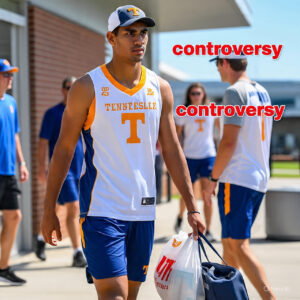Tennessee Volunteers Consider New Sponsor, Prioritize NIL Value Over Brand Alignment
In a sign of the changing tides in college athletics, the University of Tennessee Volunteers are reportedly weighing a groundbreaking decision: choosing a new corporate sponsor that offers higher NIL payouts for student-athletes, even if it comes at the expense of long-standing brand alignment. This move reflects a broader trend as universities across the country adapt to the era of NIL, where athlete compensation and program competitiveness are increasingly intertwined.
Sources close to the athletic department suggest that Tennessee is evaluating multiple sponsorship opportunities, with at least one offer on the table that includes direct NIL support for key athletes in high-profile programs such as football and basketball. The proposal, while financially lucrative, comes from a company with little historical connection to the university’s brand or regional identity—a stark departure from traditional partners like Nike, Coca-Cola, or Pilot Flying J.
A Shift in Strategy

Historically, university sponsorships have been about image, tradition, and mutual brand enhancement. These partnerships helped fund facilities, gear, and media deals, but rarely impacted individual athletes directly. The NIL era has flipped that script. Now, universities that can offer their athletes robust sponsorship ecosystems have a competitive edge in recruiting and retention.
For Tennessee, a program with ambitions of national dominance, especially in the SEC (Southeastern Conference), the decision to prioritize NIL value signals a shift from tradition to pragmatism. Athletic Director Danny White has been vocal about modernizing Tennessee athletics, and embracing the NIL market may be his most consequential move yet.
Balancing Tradition and Progress
Choosing a sponsor that is not deeply rooted in the university’s heritage could alienate some fans and alumni. Tennessee’s iconic orange-and-white branding is deeply associated with its existing partners and Southern identity. Critics argue that selling out to the highest bidder risks diluting that legacy. However, supporters point out that today’s recruits are looking for programs that can maximize their marketability—and NIL income can be a decisive factor.

“Tennessee has always had a strong sense of tradition,” says marketing professor Dr. Latasha Harmon at the University of Tennessee. “But in this new NIL landscape, tradition has to make room for transformation. Athletes aren’t just students—they’re influencers, and they want to be where their value is recognized.”
Recruiting and Retention in the NIL Era
With NIL deals now a key recruiting tool, universities that can’t offer competitive earning opportunities risk falling behind. Tennessee’s football program has already seen the power of NIL in action. The 2023 recruitment of 5-star quarterback Nico Iamaleava reportedly included a multimillion-dollar NIL package, raising eyebrows across the NCAA. If a new sponsor can help provide similar deals more consistently, it could elevate Tennessee’s athletic profile.
“Programs that embrace NIL partnerships are the ones that will thrive,” says former Tennessee football player and current ESPN analyst Joey Kent. “If you can tell a recruit that coming to Knoxville means real income, real brand exposure, and top-tier development, that’s a winning pitch.”
Long-Term Implications
The Volunteers’ consideration of an NIL-heavy sponsor reflects the broader shift in college athletics from amateurism to a business model where athletes are key stakeholders. This has implications not just for Tennessee, but for the future of university sponsorships nationwide. If other programs follow suit, traditional brand loyalty may take a backseat to financial utility.

There’s also a risk. Over-reliance on third-party companies for athlete compensation could create instability if those sponsors pull out or face controversies. It also raises ethical questions about how much influence corporate partners should have over athlete marketing and university decisions.
Conclusion
As the Tennessee Volunteers weigh their sponsorship options, the outcome may signal a new era in collegiate sports—one where NIL value trumps brand legacy. The decision is not just about money; it’s about identity, competitiveness, and the future of student-athlete empowerment.
For Tennessee fans, it’s a moment of reflection: Will they embrace a bolder, business-first approach if it means more wins and higher-profile recruits? Or will they hold fast to tradition, even if it means falling behind in the NIL arms race? Either way, the Vols stand at a critical crossroads—one that could redefine the meaning of school spirit in the modern sports era.













